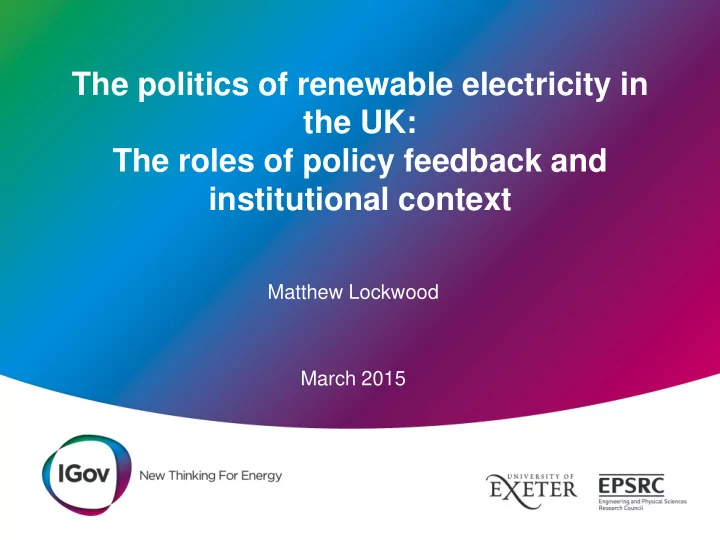

The politics of renewable electricity in the UK: The roles of policy feedback and institutional context Matthew Lockwood March 2015
Electricity from renewable sources 60 50 40 30 % 20 10 0 1990 2000 2010 2012e UK Germany Denmark Source: IEA 1
A political puzzle…. Cost as % of EU 2020 package National targets Position on GDP in target for national 2010* renewable renewables targets energy in EU 2030 package UK 0.06 15% No No binding targets Germany 0.22-0.27 18% Yes (2025, 30% binding 2035, 2050) target Denmark 0.09 30% Yes (2020, 30% binding 2050) target * Source: OECD 2013 2
Not all about who is ‘greenest’…. Source: Stubager et al (2013: 20) Source: Ipsos-MORI 3
Energy policy… Policy makers Policy and regulation Energy providers Investments Energy infrastructure outcomes • Technological change • GHG emissions 4
… in the wider political context Policy makers Regulation, Policy and taxes, Electoral/ Influencing regulation subsidies political pressure Payment for energy and policy rents Energy users Energy providers (households/voters, business) Energy Employment Vested Investments Influencing interests Demand pull Energy infrastructure Supply chains outcomes • Manufacturing • Technological change • Fuels • GHG emissions Costs
Role of ‘policy feedback’ • Idea that policies create political effects that in turn underpin or undermine the viability of the policy • Positive policy feedback (e.g. Pierson 1993, Béland 2010) creates increasing political returns and lock-in (Pierson 2000) • Low-carbon policies inevitably create negative policy feedback through costs (financial, landscape…), so need to create offsetting positive feedback effects • Possibility of increasing returns implies path dependence and divergence 6
Determinants of policy feedback effects Policy paradigms (e.g. Hall 1993) Policy design Institutional context Effects on interests, group formation, identity, etc. 7
UK policy paradigm and design • ‘Neo - liberal’/’Market led’/‘Market fundamentalist’ Policy paradigm • 1990-2002 NFFO (auctions) Deployment • 2002-2017 Renewable Obligation (RPS) (technology support mechanism banding from 2009) • 2010 onwards Fixed FiTs for <5MW • 2014 onwards CfD FiT (auction for strike price) for >5MW • Connection decisions and charging delegated to Grid access and charging network companies • Long wait for transmission connections until ‘Connect and Manage’ 2009 • Mixed incentives for connection for DNOs • None/weak Industrial strategy 8
UK institutional context • Large scale, centralised Institutional forms • Arms-length: privately owned firms connected by State-producer relationship markets or via delegated regulation • Concentrated market and lobbying power in vertically integrated firms (Big 6) • Technical capacity and data largely in private sphere • Splintered renewables lobbies • Majoritarian voting (for Westminster); w eak ‘green’ State-consumer relationship voice • Low welfare/high inequality • Household cost concerns strong in public debate - fuel poverty problem and excess profit narrative 9
UK feedback effects • Investment dominated by Big Six and large developers Pattern of investment (98% in mid-2000s) • Clustering of turbines in high wind areas • Grid access delays until mid-2000s • Supply chains mostly foreign • Policy rents accrue to Big 6 and large developers Political effects • Local planning opposition and push to off-shore • Weak employment effects, union and industrial lobbies • Media hostility to ‘green taxes’ 10
Support for renewables in principle • “Over three -quarters of UK adults (79%) said they supported the use of renewable energy sources to generate the UK’s electricity, fuel and heat, a similar proportion to March 2014 (80%) and December 2013 (77%).” (DECC Tracker survey June 2014) • Problem is lack of figurative (and literal) ownership, and where costs and benefits fall 11
Signs of change? • ~40 energy cooperatives (including JVs) by 2014 • Community and Renewable Energy Scheme in Scotland • Support to supply chain investments beginning to come through Source: DECC (2014) Energy Trends Table ET 6.4 12
Conclusions • System change is a political process • Policy design can have political effects • Institutions matter • UK has not yet locked in its renewable energy policy politically 13
References • Béland , D. (2010) ‘Reconsidering policy feedback: How policies affect politics’, Administration and Society , vol 42, pp568-59 • Hall , P. (1993) ‘Policy paradigms, social learning and the state: The case of economic policymaking in Britain’, Comparative Politics , vol 25, no 3, pp275-296 • Lockwood, M. (2015) ‘The political dynamics of green transformations: the roles of policy feedback and institutional context’ in I. Scoones, M. Leach and P. Newell (eds.) The Politics of Green Transformations (Earthscan) • OECD (2013) Effective Carbon Prices , OECD, Paris • Pierson , P. (1993) ‘When effect becomes cause: Policy feedback and political change’, World Politics , vol 45, no 4, pp595-628 • Pierson, P. (2000) ‘Increasing returns, path dependence and the study of politics’, American Political Science Review , vol 94, no 2, pp251-267 • Stubager, R., Holm, J., Smidstrup, M. and Kramb, K. (2013) Danske vaelgere 1971-2011: En oversight over udviklingen I vaelgernes holdninger mv. 2013 [Danish Voters 1971-2011: An overview of the development of voters’ attitudes], DVS 2011, www.valgprojektet.dk/files/Danskevaelgere1971-2011-Februar2013.pdf 14
Recommend
More recommend